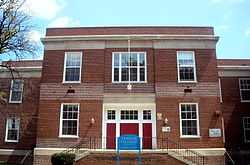William Syphax School
|
William Syphax School | |
 | |
 | |
| Location |
1360 Half St., SW Washington, D.C. |
|---|---|
| Coordinates | 38°52′33″N 77°0′31″W / 38.87583°N 77.00861°WCoordinates: 38°52′33″N 77°0′31″W / 38.87583°N 77.00861°W |
| Built | 1901 |
| Architect | Marsh & Peter |
| Architectural style | Colonial Revival |
| Governing body | Private |
| MPS | Public School Buildings of Washington, DC MPS |
| NRHP Reference # | 03000672 [1] |
| Added to NRHP | July 25, 2003 |
William Syphax School, now known as Syphax Village, is an historic structure located in the Southwest Quadrant of Washington, D.C. It was listed on the National Register of Historic Places in 2003.
History
The William Syphax School historically served African American students. It was named for William Syphax, the first president of the Board of Trustees of Colored Schools of Washington and Georgetown.[2] He supported the notion of a unified public school system and supported equal educational standards. He was responsible for the construction of the Charles Sumner School and the Thaddeus Stevens School. The building was completed in 1901 and was expanded in 1941 and again in 1953. It ceased serving as a school in the early 1990s. It then became infested with drug dealers and users. The Southwest Neighborhood Assembly took control of the building from the DC school district. Manna redeveloped the school building into a condominium development, which opened in 2005 as Syphax Village.[3] its closed an now is a condo location wsp0098
Architecture
The building was designed in the Colonial Revival style and was commissioned by the D.C. Office of the Building Inspector. It was designed by the architectural firm of Marsh & Peter. Municipal Architect Nathan C. Wyeth designed the 1941 addition. The original building is two and a half stories and is topped with a hipped roof. The exterior features a red brick façade arched windows and white terra cotta trim. The additions are also covered in red brick, but have flat roofs, multi-paned windows and limestone trim.[2]
References
- ↑ "National Register Information System". National Register of Historic Places. National Park Service. 2009-03-13.
- ↑ 2.0 2.1 "District of Columbia Inventory of Historic Sites". DC Preservation. Retrieved 2011-11-23.
- ↑ "Syphax Village". Manna DC. Retrieved 2011-11-23.
| ||||||||||||||||||||||||||